May 3, 2019 Leave a Comment
Does your baby get upset when you leave the room or when she’s with a stranger? Tackle this with our tips on dealing with Separation Anxiety in Babies.
Remember the day your baby was born? She was adorable and everyone wanted to hold her! Your baby didn’t mind it too, enjoying all the attention from Grandma, Grandpa and other family members.
Fast forward a few months and your baby is no longer the social butterfly she was when she was born! She now wails whenever someone other than her parents tries to pick her up or even when you leave the room. If you’re wondering about this change in personality, don’t worry, it’s normal. Welcome to the world of Separation Anxiety in Babies!
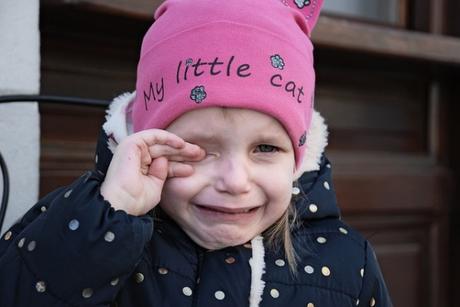
What is Separation Anxiety?
Separation anxiety is when your baby gets upset on being separated from Mom, Dad or other primary caregivers, even if it’s for a few minutes. It occurs because babies don’t have a concept of time or object permanence. Object permanence is the idea that something or someone exists even if they are not visible right now. For an infant, if she can’t see or hear Mom or Dad, then as far as she’s concerned, they’ve disappeared! Babies with separation anxiety will get highly distressed when put in a situation away from their primary caregivers.
Separation anxiety is a normal part of emotional development and is actually a good indicator that your baby is developing normally. It shows that the baby can now identify her main ‘people’, and she can understand when someone different is coming to pick her up. Congratulations – you’re now your baby’s number one person!
Separation Anxiety versus Stranger Anxiety
Separation anxiety and stranger anxiety are often used interchangeably, but while they are quite similar, they aren’t the same. Separation anxiety is triggered merely by being separated from the parent, whereas stranger anxiety occurs due to the presence of an unfamiliar person.
Both these anxieties are part of normal development, occur around the same time and show similar symptoms. In today’s article, we’ll be tackling both for the sake of ease, although it’s recommended to keep in the mind the subtle differences between both.
Stranger or separation anxiety in babies is also a sign of their developing survival instincts, especially since it occurs when babies are starting to move around. The fear generated on being separated from their parents or in the presence of strangers triggers the instinct to seek protection with a familiar person. If this instinct wasn’t present, babies would just crawl away or go away with anyone without any hesitation.
When it comes to stranger anxiety, studies show that babies also copy cues from their mothers or fathers. If the mother reacts with fear or any negative emotion when a certain person approaches, the baby is likely to mimic the same behavior towards that person.
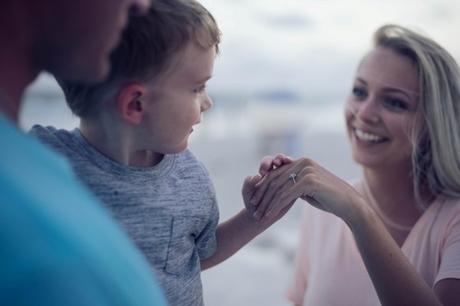
When does Separation Anxiety in Babies occur?
The earliest signs of anxiety in babies can be spotted around 4 months, when infants behave a little differently with people other than Mom or Dad. However, proper separation anxiety occurs around 6-7 months, peaking between 9-18 months and settling down by the second birthday. Common instances this can be seen are:
- When you leave the room
- When you go back to work
- When baby is alone in her cot at night
- When guests try to approach the baby
- If there is a new maid/baby sitter
- When a new person is hired at the daycare center
Separation anxiety can vary in degree, based on many factors. Some children may get extremely upset, while others may just be mildly uncomfortable. Boys tend to have more anxiety with strangers compared to girls. The level of anxiety also depends upon the stranger – taller or larger people are more fearful to children, as are those who are sitting or standing too close to them. Children also tend to feel more anxious in the presence of men than women.
Signs of Separation Anxiety in Babies
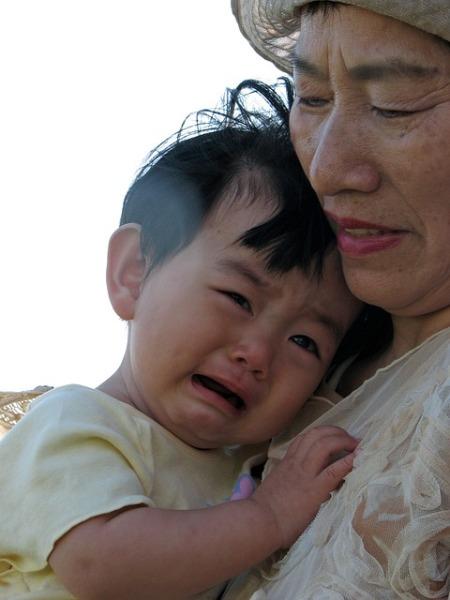
- Crying/wailing loudly
- Rapid breathing
- Fussing about
- Going from room to room looking for Mom/Dad
- Turning away from the stranger
- Running towards Mom or Dad, asking to be carried
- Running to the opposite end of the room
- Become unnaturally quiet
- Hiding behind furniture or a familiar person
While all these signs are perfectly normal in babies of this age, it can be upsetting for everyone – the baby, you and of course, the well-meaning stranger who’s being rejected so rudely! This can create some awkward situations with family members and is also a pain when trying to get young kids used to a new baby sitter or a new daycare center. While separation anxiety in babies can’t be prevented altogether, there are a few things you can do to ease the situation for everyone involved.
How to Deal with Separation Anxiety in Babies
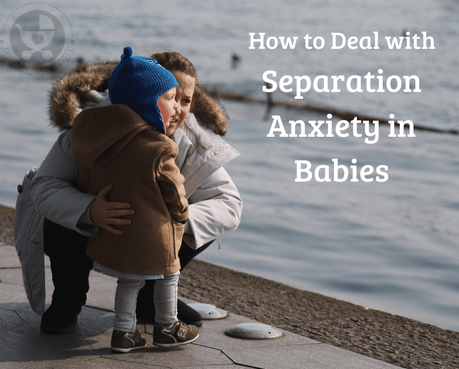
Separation Anxiety within the home
- Babies are naturally curious and will tend to wander off from the room occasionally. Once you’ve assured yourself of his safety, avoid following your baby wherever he goes, so he gets used to being by himself for a while.
- If you need to go to another room, tell your child that you’re going and will be back. From the other room, call out to let her know that you’re still there.
- To avoid separation anxiety at night, spend more time during baby’s bedtime routine. Cuddle, sing and read a book together till baby naturally drifts off.
With Other Care Givers
- Babies cope with new things gradually, so make the transition smooth. Don’t introduce a new person, a new routine and a new place all at once. Start by leaving your baby with a familiar person for 15 minutes. Slowly increase it to one hour.
- Start by leaving baby with familiar people before introducing new baby sitters. He will be less upset than if it were a complete stranger.
- If grandparents or uncles or aunts are coming over to watch the baby while you’re away, let them come in a few days earlier so the baby has time to get familiarized.
- If a new baby sitter is taking over, let her come and spend time with everyone for some days before the baby has to be left alone with her.
- Make sure baby is fed and well rested before you leave, so he’s in a good mood and can handle the separation better.
- Don’t make the good bye a big deal – keeping it casual and lighthearted will reduce the baby’s anxiety.
- Let the babysitter make things easier for the baby by comforting her saying that Mom will be back soon.
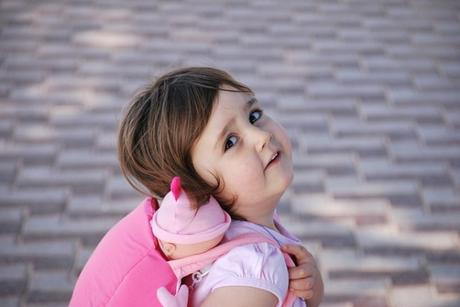
At the Daycare Center
- Take your baby’s comfort toy with you when leaving him at the center, like a favorite teddy or blanket.
- You can also leave behind something that’ll remind the baby of your presence, like a scarf that has your scent.
- Try to ensure that your baby is occupied in something interesting when you leave so he’s less likely to get upset.
- Don’t sneak off – have a quick good bye ritual where you tell your child that you’re going and will be back soon. A predictable routine repeated everyday will instill a sense of security in your baby.
- Don’t put on a sad face when you leave – babies can quickly catch on to their parents’ anxiety and it can make them feel that the place they’re in isn’t safe.
- For toddlers, you can tell them that the new place is going to be lots of fun. You can also make plans for things you’ll do when you get back so the child has something to look forward to.
With Strangers
- Avoiding strangers completely does not help with stranger anxiety; introduce the child to new people frequently, preferably in familiar places.
- Carry the child or hold his hand when meeting a new person to make him more comfortable.
- Stay in the same room at a small distance so your child knows that you’re nearby and can be more comfortable with the new person.
- Let the new person know that your child tends to get anxious around strangers, so that they can adjust their approach to the child.
- Let the new person communicate with the child from a distance initially, and get closer as the baby gets more familiar.
- Closely watch the baby for signs that she’s getting upset – in such situations, increase the distance between the child and the stranger and stay close to the child
In any of the above scenarios, the most important thing to do is to acknowledge the child’s feelings rather than brushing them away. Avoid saying things like, ‘You’re such a baby’. Never make fun of the child for behaving in this manner. Forcing the child into an uncomfortable situation will only backfire and increase his anxiety. If your child tends to get upset a lot, avoid situations that might trigger his anxiety and take things very slowly.
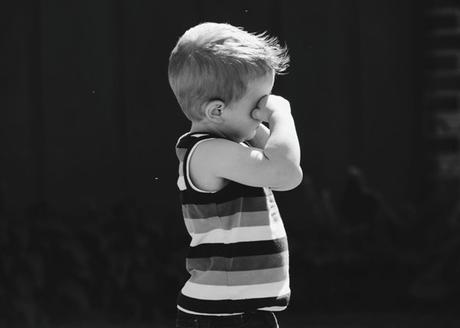
Extreme Cases
In some cases, normal separation anxiety or stranger anxiety can take on a more severe turn, which can affect the child’s normal development.
Separation Anxiety Disorder is an extreme case of separation anxiety, and it usually occurs in older children, seen in about 4% of children going to school or preschool. Signs of Separation Anxiety Disorder include:
- Refusal to go to school or daycare
- Refusal to sleep alone
- Constant worry about something bad happening to the child or his parents
- Complains of feeling unwell during episodes of separation
Extreme cases of stranger anxiety can be caused by Stranger Terror, which is a severe fear of strangers. Signs of Stranger Terror include:
- Screaming or crying loudly when a stranger is present, even if it’s in the child’s home
- Not allowing to be carried by anyone other than the primary caregiver
- Not getting comforted by anyone other than the primary caregiver
- Being unnaturally silent for long periods of time
Such cases can result in social anxiety as the child gets older, especially if there is a family history of anxiety. In case you observe any of these symptoms, it’s recommended to talk to your child’s pediatrician who can refer you to a specialist if necessary.
More than anything else, it’s important to consider your child’s feelings over everyone else’s, no matter how awkward the situation may be. Encouraging the child to be independent from a young age can also help in overcoming such anxieties in the future. With enough patience and a positive attitude, you can all overcome this phase with ease.
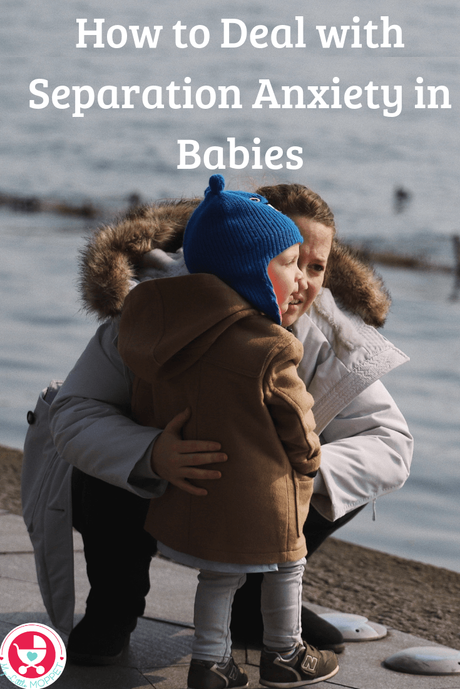
Organic · FSSAI Certified · NABL Lab certified Buy Sprouted Sathumaavu Health Mix powder for Babies / Homemade Cerelac Dry Fruits Powder for Babies/Toddlers Pancake Mixes for Toddlers TweetPinShare+1WhatsAppEmail
Filed Under: Baby, Parenting Tagged With: anxiety, babies, baby care, parenting, parenting tips, separation anxiety, stranger anxiety
